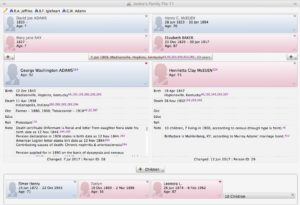 One of the things I love about handling digital, rather than paper, documents is I never have to deal with a big pile of papers waiting to be filed. Over the long Independence Day weekend, I did a whole lot of genealogy research. I was researching the ten (!) children of my great great grandfather, George Washington Adams, and hitting lots of pay dirt. They were born in the late 19th century and died in the mid- to late 20th century so there were lots easily accessible documents available to me.
One of the things I love about handling digital, rather than paper, documents is I never have to deal with a big pile of papers waiting to be filed. Over the long Independence Day weekend, I did a whole lot of genealogy research. I was researching the ten (!) children of my great great grandfather, George Washington Adams, and hitting lots of pay dirt. They were born in the late 19th century and died in the mid- to late 20th century so there were lots easily accessible documents available to me.
The problem with lots of easily accessible documents is that it can seem tedious to process them. Suddenly a census document with five kids feels like a drag rather than a treasure. That’s probably the time to take a break from the research session. Instead of taking a break and coming back fresh, what I did this weekend was save these documents to the top of my Surnames folder (as a parking lot) so I could process them later. Then I would move on to the next discovery.
On July 3 I realized my backlog was getting ridiculous and on July 4, when I found 25 documents about one particular family (who kept doing newsworthy things like filing and re-filing for divorces and marriages license), I actually processed each one before moving on to the next. (If you’re wondering what I mean by process, here’s where I describe my digital workflow.) That family lived in Indiana where death certificates are readily available and easily findable.
By weekend’s end, I had a backlog of 25 to 30 documents that I needed to deal with. I’m still researching 30 minutes a day, so I determined that those 30 minutes would be spend chipping away at the backlog, processing each document as I came to it (gleaning every bit of information and adding it to Reunion), until the backlog is gone. Today was my third day of working on the backlog and I made it through four documents before my timer went off.
I have only nine documents to go, thankfully. I want to try hard to avoid creating a backlog again. The problem, of course, is that if I’m keeping my focus on an individual and Ancestry puts one his relatives in front of me, it’s hard to ignore the relative. But that’s where my research log comes in. I can write down the new person I’ve come to, complete with a link to the document I found, and then include that person in the next steps I jot down at the end of each session. Or, if I have plenty of time, I can go ahead and process the document(s) for the new person, but make a note to come back to the original person when I’m finished. My goal is to not have unprocessed documents on my hard drive, if I can avoid it.
One of the challenges of genealogy research is balancing the thrill of discovery with the mundane tasks of processing the discoveries. As a professional organizer, I rather enjoy processing documents, but doing nothing but processing them gets tedious. By processing every document as I come to it rather than putting it off, I avoid whole sessions where all I do is process. For me, that’s a great way to have a balanced genealogy session.
Edited to add: I wrote this post on Friday morning, and on Friday afternoon I took a four-hour non-stop flight to Portland, Oregon. I spent the bulk of the time processing my backlog (which was a very enjoyable way to pass the time) and by the time we landed, it was gone, with the exception of two documents I needed to go online to suss out a little more. By Saturday morning, the backlog had vanished. Hooray!

I know exactly what you mean with the census records, Janine. Only mine are for Luxembourg and half of them include a cover sheet, page with the entries, and the back page which also includes important info. Not getting them done in 30 minutes sittings. And they did them an average of every 3-5 years between 1843-1900. Do I need to say I am a full week behind on the planned post for the family? I had to “lump” the task in my Research Manager under the father of the family instead of for each person – just too many steps to write it all out. Yes, it gets tedious but the timeline is going to be awesome!
Yes! Keep your eye on the prize. That sounds like a wonderful, overwhelming treasure trove!